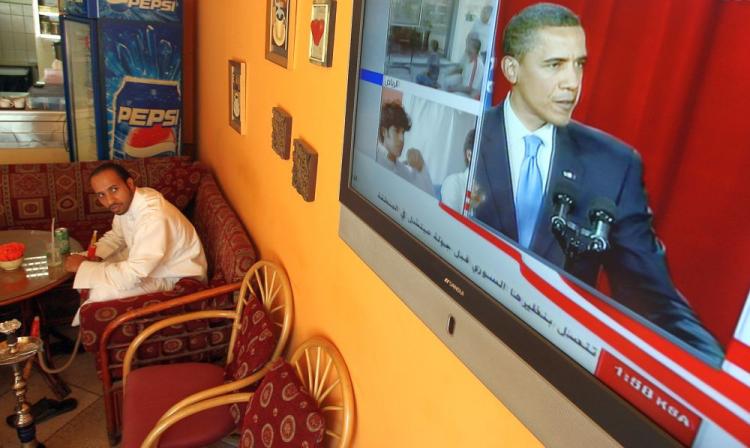Following a year of ambitious foreign policy goals, the Obama administration is still struggling to make significant breakthroughs on an array of complex issues. Among the greatest challenges to the administration are countries in the Middle East—including Afghanistan, Pakistan, Israel, Iraq, and Iran.
Despite the challenges, significant progress has been made in strengthening the United States’ standing in the world, according to the White House.
Among what the administration is calling “progress” are milestones, such as ordering the closure of the Guantanamo Bay prison, a new strategy in Iraq and Afghanistan, and the appointment of several key envoys.
The U.S. Special Envoy to the Middle East George Mitchell has made multiple trips to the region since his appointment less than a year ago. According to comments Mitchell made during a Jan. 6 PBS interview with Charlie Rose, restarting the peace process in Israel has been among the administration’s top concerns from the beginning.
Mere days after Obama was inaugurated as president, he asked Mitchell to immediately go to Israel. A key concern: restarting stalled peace talks between the Israelis and the Palestinians.
“We think the time has come to enter negotiations,” Mitchell said during the Jan. 6 interview, adding cautiously, “There are no magic bullets here.”
But restarting peace talks has proven extremely difficult and became more complicated recently when 20 rockets and mortar rounds were fired at Israel from the Gaza Strip.
When pressed over what “sticks” the United States has to pressure Israel to move forward in peace talks, Mitchell had a surprising response that has raised the ire of the Israeli public.
“Under American law, the United States can withhold loan guarantees to Israel—President George W. Bush did so on one occasion,” said Mitchell. “That’s one mechanism that’s been publicly discussed. We think the way to approach this is to try to persuade the parties what is in their interest.”
During a seminal speech in Cairo on June 4, 2009, President Obama himself took a strict stance on the situation.
“Threatening Israel with destruction—or repeating vile stereotypes about Jews—is deeply wrong,” said Obama during the speech, adding that the other side of the coin is just as serious. “The situation for the Palestinian people is intolerable. And America will not turn our backs on the legitimate Palestinian aspiration for dignity, opportunity, and a state of their own.”
In Iraq, Afghanistan, and Pakistan, the administration’s approach intersects on multiple fronts, particularly defense.
In a Jan. 7 speech at The Washington Institute, Admiral Michael Mullen, Chairman of the Joint Chiefs of Staff, noted that the increased focus on Afghanistan and Pakistan does not signify a lessening commitment in other countries.
“By no means do I want to send a message that we’re taking our eye off Iraq, because that’s not the case,” said Mullen in the speech. “Al-Qaeda is still there, and very specifically, al-Qaeda in Iraq, planning spectacular bombings like the … three that we’ve seen in recent months.”
Despite the fact that U.S. troop levels in Iraq will be down to 50,000 troops by next summer, and to zero by the end of 2011, that will not be the end of the U.S. involvement.
“Today, America has a dual responsibility: to help Iraq forge a better future and to leave Iraq to Iraqis,” said Admiral Mullen. “I have made it clear to the Iraqi people that we pursue no bases and no claim on their territory or resources. Iraq’s sovereignty is its own.”
In contrast, Afghanistan and Pakistan, closely linked politically and militarily, have become the major focus of the Obama administration’s foreign policy.
Including the current troop surge, there will be close to 68,000 U.S. troops and more than 45,000 NATO and International Security Assistance Force troops in Afghanistan. The plan is to train and establish an Afghan army 134,000 strong by 2011.
Although U.S. troops are scheduled to withdraw in two years, Afghan Defense Ministry spokesman Mohammad Zahir Azimi, told RIA Novosti (Russian Information Agency) that the Afghan military should be able to defend the country without help from foreign troops within four years, Stratfor reported.
According to General Stanley McChrystal, a strategy in building the Afghan security force will be to first increase the number of trainees who have had any level of training. The long-term goal will be for the Afghans to recognize the security force.
“The focus of the Afghanistan-Pakistan strategy in the president’s decision is every bit as much on Pakistan as it is on Afghanistan,” said Admrial Mullen in his Jan. 7 speech. “It’s about essentially a region that must be addressed and must be addressed in a way that moves positively towards better security and not in the direction that it certainly is going in Afghanistan right now.”
President Obama has repeatedly emphasized that despite a ramp-up of troops on the ground, his administration’s strategy in Afghanistan is not a long-term military engagement.
“We do not want to keep our troops in Afghanistan,” said Obama in his June 4 Cairo speech. “We seek no military bases there.”
Other countries in the Middle East, notably Iran, have presented Obama’s young administration with significant challenges. Iranian leadership, bent on opposing and threatening its neighbors, particularly Israel, has further complicated an already tense situation.
Despite the challenges, significant progress has been made in strengthening the United States’ standing in the world, according to the White House.
Among what the administration is calling “progress” are milestones, such as ordering the closure of the Guantanamo Bay prison, a new strategy in Iraq and Afghanistan, and the appointment of several key envoys.
The U.S. Special Envoy to the Middle East George Mitchell has made multiple trips to the region since his appointment less than a year ago. According to comments Mitchell made during a Jan. 6 PBS interview with Charlie Rose, restarting the peace process in Israel has been among the administration’s top concerns from the beginning.
Mere days after Obama was inaugurated as president, he asked Mitchell to immediately go to Israel. A key concern: restarting stalled peace talks between the Israelis and the Palestinians.
“We think the time has come to enter negotiations,” Mitchell said during the Jan. 6 interview, adding cautiously, “There are no magic bullets here.”
But restarting peace talks has proven extremely difficult and became more complicated recently when 20 rockets and mortar rounds were fired at Israel from the Gaza Strip.
When pressed over what “sticks” the United States has to pressure Israel to move forward in peace talks, Mitchell had a surprising response that has raised the ire of the Israeli public.
“Under American law, the United States can withhold loan guarantees to Israel—President George W. Bush did so on one occasion,” said Mitchell. “That’s one mechanism that’s been publicly discussed. We think the way to approach this is to try to persuade the parties what is in their interest.”
During a seminal speech in Cairo on June 4, 2009, President Obama himself took a strict stance on the situation.
“Threatening Israel with destruction—or repeating vile stereotypes about Jews—is deeply wrong,” said Obama during the speech, adding that the other side of the coin is just as serious. “The situation for the Palestinian people is intolerable. And America will not turn our backs on the legitimate Palestinian aspiration for dignity, opportunity, and a state of their own.”
In Iraq, Afghanistan, and Pakistan, the administration’s approach intersects on multiple fronts, particularly defense.
In a Jan. 7 speech at The Washington Institute, Admiral Michael Mullen, Chairman of the Joint Chiefs of Staff, noted that the increased focus on Afghanistan and Pakistan does not signify a lessening commitment in other countries.
“By no means do I want to send a message that we’re taking our eye off Iraq, because that’s not the case,” said Mullen in the speech. “Al-Qaeda is still there, and very specifically, al-Qaeda in Iraq, planning spectacular bombings like the … three that we’ve seen in recent months.”
Despite the fact that U.S. troop levels in Iraq will be down to 50,000 troops by next summer, and to zero by the end of 2011, that will not be the end of the U.S. involvement.
“Today, America has a dual responsibility: to help Iraq forge a better future and to leave Iraq to Iraqis,” said Admiral Mullen. “I have made it clear to the Iraqi people that we pursue no bases and no claim on their territory or resources. Iraq’s sovereignty is its own.”
In contrast, Afghanistan and Pakistan, closely linked politically and militarily, have become the major focus of the Obama administration’s foreign policy.
Including the current troop surge, there will be close to 68,000 U.S. troops and more than 45,000 NATO and International Security Assistance Force troops in Afghanistan. The plan is to train and establish an Afghan army 134,000 strong by 2011.
Although U.S. troops are scheduled to withdraw in two years, Afghan Defense Ministry spokesman Mohammad Zahir Azimi, told RIA Novosti (Russian Information Agency) that the Afghan military should be able to defend the country without help from foreign troops within four years, Stratfor reported.
According to General Stanley McChrystal, a strategy in building the Afghan security force will be to first increase the number of trainees who have had any level of training. The long-term goal will be for the Afghans to recognize the security force.
“The focus of the Afghanistan-Pakistan strategy in the president’s decision is every bit as much on Pakistan as it is on Afghanistan,” said Admrial Mullen in his Jan. 7 speech. “It’s about essentially a region that must be addressed and must be addressed in a way that moves positively towards better security and not in the direction that it certainly is going in Afghanistan right now.”
President Obama has repeatedly emphasized that despite a ramp-up of troops on the ground, his administration’s strategy in Afghanistan is not a long-term military engagement.
“We do not want to keep our troops in Afghanistan,” said Obama in his June 4 Cairo speech. “We seek no military bases there.”
Other countries in the Middle East, notably Iran, have presented Obama’s young administration with significant challenges. Iranian leadership, bent on opposing and threatening its neighbors, particularly Israel, has further complicated an already tense situation.






